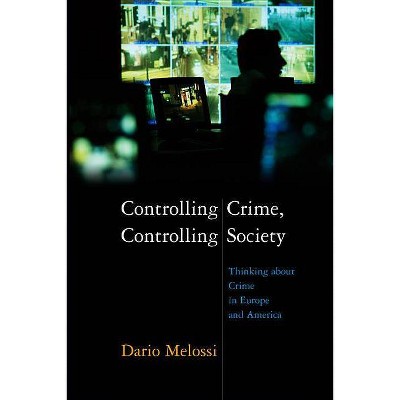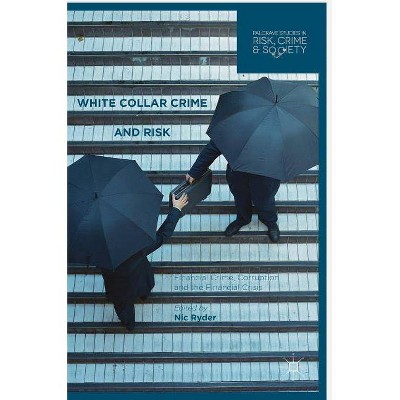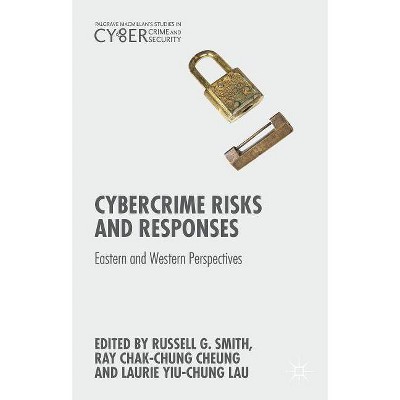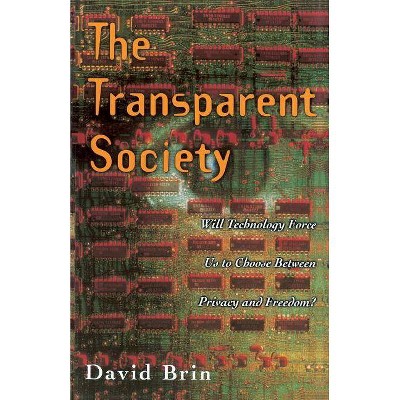Cybercrime - (Crime and Society) by David S Wall (Paperback)

Similar Products
Products of same category from the store
AllProduct info
<p/><br></br><p><b> Book Synopsis </b></p></br></br>How has the internet transformed criminal behaviour? What is different about cybercrime compared with traditional criminal activity? What new criminal opportunities have arisen? What impact might cybercrime have on public security? <p>In this exciting new text, David Wall carefully examines these and other important issues. He discusses what is known about cybercrime, disentangling the rhetoric of risk assessment from its reality.<br /> </p> <p>Looking at the full range of cybercrime, he shows how the increase in personal computing power available within a globalized communications network has affected the nature of and response to criminal activities. Drawing on empirical research findings and multidisciplinary sources he goes on to argue that we are beginning to experience a new generation of automated cybercrimes, which are almost completely mediated by networked technologies that are themselves converging.<br /> </p> <p>We have now entered the world of low impact, multiple victim crimes in which bank robbers, for example, no longer have to meticulously plan the theft of millions of dollars. New technological capabilities at their disposal now mean that one person can effectively commit millions of robberies of one dollar each. Against this background, David Wall scrutinizes the regulatory challenges that cybercrime poses for the criminal (and civil) justice processes, at both the national and the international levels.</p> <p>This book offers the most comprehensive, and intellectually robust, account of cybercrime currently available. It is suitable for use on courses across the social sciences, and in computer science, and will appeal to advanced undergraduate and graduate students.</p><p/><br></br><p><b> From the Back Cover </b></p></br></br>How has the internet transformed criminal behaviour? What is different about cybercrime compared with traditional criminal activity? What new criminal opportunities have arisen? What impact might cybercrime have on public security? <p>In this exciting new text, David Wall carefully examines these and other important issues. He discusses what is known about cybercrime, disentangling the rhetoric of risk assessment from its reality. Looking at the full range of cybercrime, he shows how the increase in personal computing power available within a globalized communications network has affected the nature of and response to criminal activities. Drawing on empirical research findings and multidisciplinary sources he goes on to argue that we are beginning to experience a new generation of automated cybercrimes, which are almost completely mediated by networked technologies that are themselves converging. We have now entered the world of low impact, multiple victim crimes in which bank robbers, for example, no longer have to meticulously plan the theft of millions of dollars. New technological capabilities at their disposal now mean that one person can effectively commit millions of robberies of one dollar each. Against this background, David Wall scrutinizes the regulatory challenges that cybercrime poses for the criminal (and civil) justice processes, at both the national and the international levels.</p> <p>This book offers the most comprehensive, and intellectually robust, account of cybercrime currently available. It is suitable for use on courses across the social sciences, and in computer science, and will appeal to advanced undergraduate and graduate students.</p><p/><br></br><p><b> Review Quotes </b></p></br></br><br>Will enhance all readers' knowledge and understanding of this complex and fast-moving subject.<br /> <i><b>Jane's Police Review</b></i><br /> <br /> <p>Wall acknowledges in the preface that the task of describing Cybercrime is hard as the subject matter changes rapidly. Nevertheless, three years after Wall finished his work it is still in many ways current ... A well researched, thoughtful and up-to-date examination of the reasons why cybercrime flourishes. I warmly recommend the book for any cybercrime class and cyber society scholar's bookshelf.<br /> <b><i>International Journal of Emerging Technologies and Society</i></b></p> <p>The work of David S. Wall, who for ten years has studied the Web and the ways to police it, is clear evidence that a book about the Internet could be a thoughtful, complete, and up-to-date analysis of cybercrime and the problems that it produces.<br /> <b><i>Crime, Media, Culture</i></b></p> <p>Whether new to or familiar with the subject of cybercrime, those interested will enjoy reading this clear, comprehensive and in-depth analysis of how crime and policing are transformed in the information age. Indeed, in ten chapters, a glossary and an index, the author offers an excellent panorama of the key issues in cybercrime.<br /> <b><i>Information, Communication and Society</i></b></p> <p>Wall writes with wry wit ... he has to be congratulated, not only for putting together a compendium of cybercrime, but also for suggesting a structured way to understand it. He is an obvious master in this new, difficult and developing field of criminological enquiry.<br /> <b><i>Surveillance and Society</i></b></p> <p>A thoughtful and thought-provoking book which makes important links between the law, policing, social policy and the criminology of social control.<br /> <b><i>International Review of Law, Computers and Technology</i></b></p> <p>A trenchant examination of [the] shifting landscape of crime ... Wall's work makes an important contribution to the study of cybercrime and raises interesting moral, ethical and legal concerns surrounding the policing of crime in an increasingly network-mediated, globalised world.<br /> <b><i>Political Studies Review</i></b></p> <p>His intended audiences are 'advanced undergraduates and graduate students' and I am sure that for them, and for many others, it will rank as a 'must-have' because it is absolutely stuffed with references.<br /> <b><i>Political Quarterly</i></b></p> <p>David Wall's <i>Cybercrime</i> is a refreshing look at new forms of crime. Rather than 'decent' desperate nineteenth-century street crime that sends minorities to prison, cybercrime is virtually new; a risky frontier for the middle classes. These new forms find the police ill suited and untrained for their investigation, businesses ready to exploit them, academics fretting - and few, other than David Wall, writing about them with clarity, honesty and detail. Shut down your computer and have a look at this book.<br /> <b>Peter K. Manning, <i>Northeastern University</i></b></p> <p>Cybercrime is a rapidly changing landscape, and David Wall's important book is a wonderful introduction to the subject. Up-to-date, comprehensive, and readable, it provides an impressive overview of the varieties of contemporary cybercrime, and the many institutions in the public, private, and voluntary sectors that work toward its prevention and control.<br /> <b>Peter Grabosky, <i>Australian National University</i></b></p> <p>This stimulating, thoughtful and well written book is an ideal review of the way that electronic communications have changed (and yet in many ways have not changed) the world of crime and its control. It should be read by all who are prepared to move beyond the usual crimes and the usual suspects.<br /> <b>Michael Levi, <i>Cardiff University</i><br /> </b></p><br><p/><br></br><p><b> About the Author </b></p></br></br><b>D.S. Wall</b>, Professor of Criminal Justice, Head of the School of Law and member of the Centre for Criminal Justice Studies, University of Leeds
Price History
Price Archive shows prices from various stores, lets you see history and find the cheapest. There is no actual sale on the website. For all support, inquiry and suggestion messages communication@pricearchive.us




















